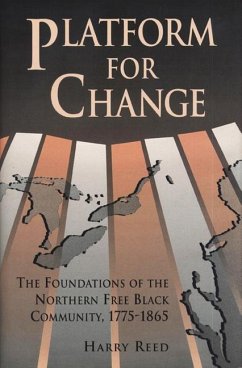Platform for Change: The Foundations of the Northern Free Black Community, 1775-1865 challenges prevailing ideas about the passivity of African Americans in the antebellum North. At the same time, the work clearly demonstrates that the methods blacks used to respond to their political and social milieus were not merely reactions to white racism. Instead, late eighteenth- and early nineteenth-century blacks are shown to have been motivated by human and social needs that, by and large, have been ignored by historians. Harry Reed reveals how, during this era, American blacks created a cultural identity and, at the same time, attacked the remnants of Northern slavery and the entire institution in the South. Taken collectively, the pre-Civil War activities of blacks in Boston, New York, and Philadelphia provided strong cultural underpinnings for the sense of black community that emerged after 1865. To the extent that they were able to confront racism, their spiritual strength was visibly reinforced by a strong cultural sense and an instinct for survival. What emerged during these nine decades was a marvelously complex, organic community, one that possessed its own rationale for existence, its own forms for enhancing collective life, and its own structures for meeting physical and spiritual needs, as well as the means for addressing external power centers that often had severe, negative impacts on blacks themselves.
Hinweis: Dieser Artikel kann nur an eine deutsche Lieferadresse ausgeliefert werden.
Hinweis: Dieser Artikel kann nur an eine deutsche Lieferadresse ausgeliefert werden.








